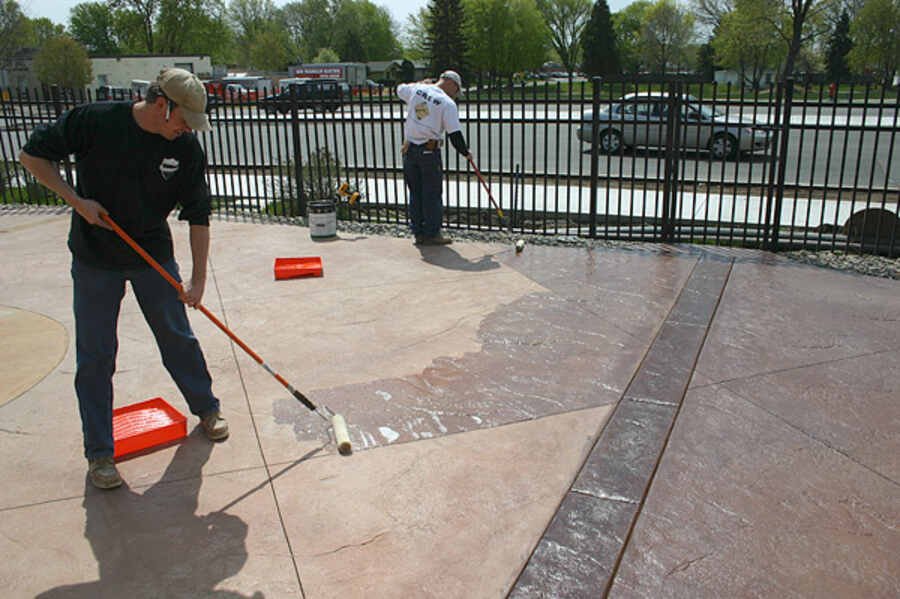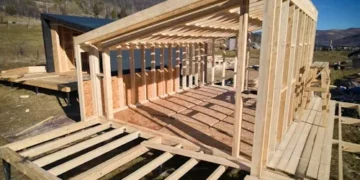Concrete is not the best material for attractive construction, but it plays an important role in construction. From sidewalks to skyscrapers, it’s the backbone of most modern buildings and structures. But let’s be honest. No one finds it that interesting to talk about concrete, not even contractors. It’s grey, it’s dull, and it’s just not that hard to work with. That is until you need to seal it.
Sealing concrete is essential for protecting it from damage caused by exposure to the elements, such as rain, snow, and sunlight. It also helps to prevent stains from oil, grease, and other substances that can penetrate its surface. But most importantly, this step can enhance the material’s appearance, making it more attractive and easier to maintain.
However, it is not so easy doing it. This is a porous material, meaning that it is full of tiny holes and gaps that can allow water and other substances to penetrate it. This makes it hard to create a barrier that can effectively seal the surface. Additionally, the type of sealer you choose should correspond with the concrete surface, the environment and climate it will be exposed to, and the level of gloss and appearance you want to achieve.
If you’re in the process of a construction project or doing repairs, you know that protecting your building materials is key to success. So, this article covers the types of concrete sealers and how to choose the best one for your project. Don’t worry, we’ll make it as interesting as possible and back it up with concrete evidence (See what we did there?).
Consider the Different Types of Sealers Available
Penetrating
This type can penetrate the concrete surface, creating a chemical reaction that strengthens and hardens the concrete. It’s the ideal solution if looking for an outdoor concrete sealer, as it can provide excellent protection against water and other elements.
Acrylic
Acrylic coatings form a protective film on the surface. They are available in a range of sheen levels, from matte to high gloss, and are ideal for indoor applications as they can resist stains and abrasions.
Epoxy
These sealants are a two-part system that creates a tough, durable surface. They are ideal for high-traffic areas and provide excellent protection against chemicals and abrasions.
Polyurethane
Although similar to epoxy coatings, they are more flexible, making them ideal for concrete surfaces that are prone to cracking and shifting. They are also resistant to UV rays and weathering, making them ideal for outdoor applications.
Silicate
This is a reflective sealer that penetrates the surface and chemically reacts to form a hard, crystalline surface. It’s ideal for concrete surfaces that are exposed to heavy traffic and extreme weather conditions.
Consider the Type of Project
Outdoor Patio
Outdoor patios and driveways are excellent examples of a surface that needs to be sealed to protect it from the elements. In this case, a penetrating outdoor concrete sealer would be the right choice.
Penetrating sealers work by getting deep into the surface of the material, creating a strong bond that can withstand exposure to the elements. This is especially important for outdoor areas, which are exposed to rain, snow, and sunlight.
A concrete patio or driveway coating should protect against stains from oil, tyre prints, ice, fading or yellowing, water stains, dust, mould, and chemicals used in lawn care. So, the ideal concrete sealer for outdoor use is UV-resistant, permeable, and non-slip even when wet.
When using a high-quality sealant, maintaining outdoor spaces is simple. All you need to do is wash the driveway or patio with soap and water or a degreaser designed for use on cement. With good care, you will only need to reapply the sealant every three years or so.
Retail Store Floor
A retail store floor needs to be sealed to protect it from stains and abrasions. In this case, an acrylic sealer would be an excellent choice. Acrylic products create a protective film on the surface of the concrete, making it resistant to stains and abrasions. They are also available in a range of sheen levels, making it easy to find a solution that matches the look you’re going for.
Warehouse Floor
In this case, an epoxy coating would be an excellent choice. Epoxy products create a tough, durable surface that is resistant to chemicals and abrasions. This makes them ideal for high-traffic areas like warehouses, where heavy machinery and foot traffic can quickly wear down the surface.
Cracks and Seams Repair
Everything from heat expansion to the growth of tree roots can result in cracks in concrete. A sealant will keep moisture out of cracks and seams on driveways. If you have trees on or near your concrete driveway, it’s important to keep an eye on any cracks that may form due to their growth. Contacting Vernon Imel Tree Service can help ensure your trees are properly maintained, reducing the likelihood of damage to your driveway.
Basement Floors
Concrete in garages, warehouses, and basements endures a lot of wear and tear over time. Applying a floor sealer will not only increase and preserve the beauty of your floor but also its lifespan.
You can choose between water-based and solvent-based acrylic floor sealers. Yet, compared to water-based acrylic sealers, a solvent-based sealer will offer more years of service.
Interiors
Many modern materials use bare concrete for an industrial-style effect on surfaces like countertops, walls and even floors. Unfortunately, liquids can penetrate the surface of bare concrete, carrying stains deeper into the material which makes them hard to remove. Applying a protective coating helps shield surfaces from heat, stains, and etching to function properly.
Consider the Decorative Potential
As mentioned, these protective products can do more than simply safeguard surfaces. They can improve or intensify the colour and give the completed surface some shine. Manufacturers of sealants accomplish this by combining their products with colouring methods to produce distinctive decorative finishes.
With the variety of decorative floor coating solutions available on the market, you have the alternatives you need to fit any area. These products often contain metallics, quartz, chip mixes, and solids to add the desired finishing touch to any surface.
They can also be used to replicate the look of other more upscale finishes and materials. For instance, coloured chip blends and resin finishes mimic terrazzo’s look at a fraction of the price and are far less expensive to maintain because they don’t need further buffing or waxing.
To Sum Up
Choosing the right sealer for your project can be a difficult task, but it is essential for ensuring the longevity and durability of your surfaces. So, you must have a good understanding of the types of sealers available in the market and how to test them for compatibility with the surface. So, whether you’re sealing a sidewalk or a skyscraper, take the time to choose the right sealer for the job, and your concrete surfaces will thank you for it.
Recommended Posts:















